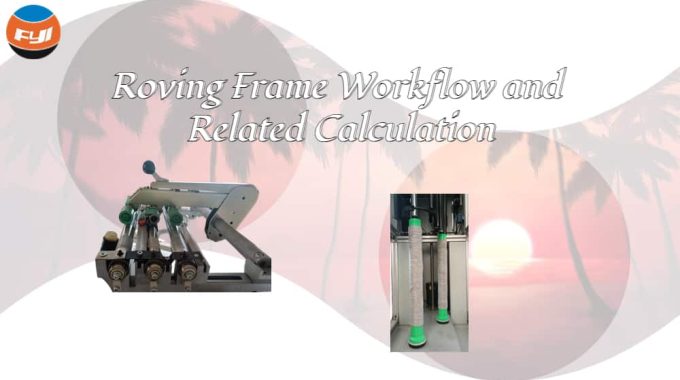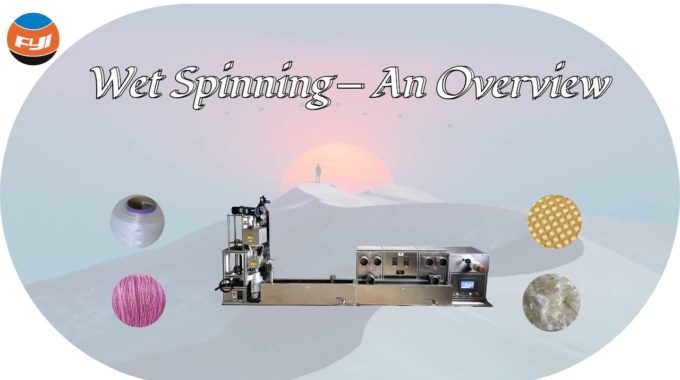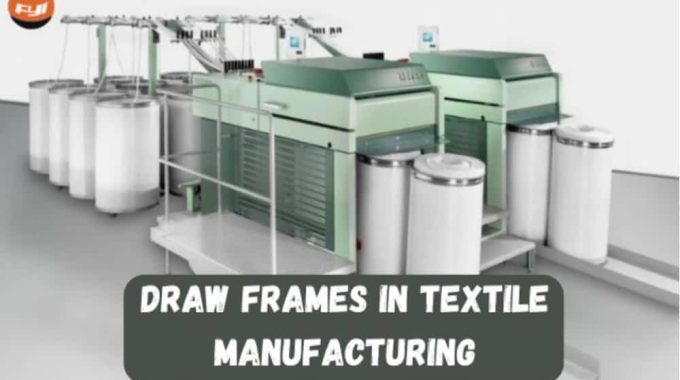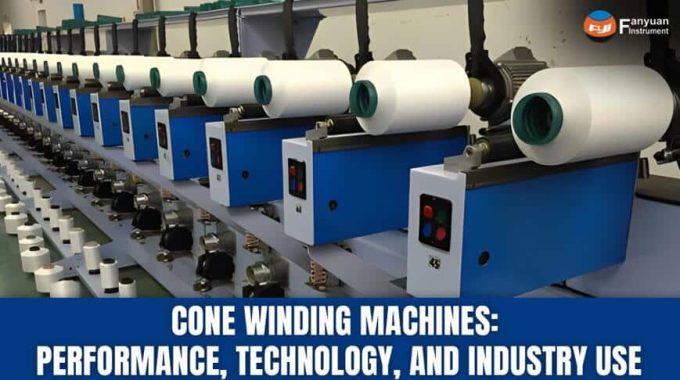
Cone Winding Machines: Performance, Technology, and Industry Use
Cone winding is an essential part of yarn preparation in the textile industry. These machines take yarn from hanks, skeins, or bobbins and wind it neatly onto cones. This step prevents tangles, breakage, and uneven feeding in the next process, like weaving, knitting, or dyeing.
If you work in a textile lab, garment factory, or quality department, understanding cone winding machines can make your work easier. These machines make yarn clean, even, and strong – ready for whatever comes next. A good cone winding machine can save time, reduce waste, and improve final product quality.
In this guide, you will learn how these machines work, their types, features, testing methods, and how to choose the right one for your needs. Whether you are upgrading your machine or starting new, this guide will help you make a better choice.
Contents
- 1 What is Cone Winding?
- 2 Types of Cone Winding Machines
- 3 Working Principle and Testing Methods of Cone Winding Machines
- 4 Performance and Technical Parameters of the Equipment
- 5 Product Quality and Brand Reputation
- 6 Industry Testing Standards and Compliance
- 7 Price, Cost-Effectiveness, and Maintenance Requirements
- 8 Conclusion
What is Cone Winding?
Cone winding is the process of transferring yarn from hanks, skeins, or bobbins onto cone-shaped packages. This is an important step in textile production as it prepares the yarn for further processes like weaving, knitting, or dyeing.
During cone winding, the yarn is wound evenly and under controlled tension so the yarn feeds smoothly in the next stages. The process also removes yarn defects, improves consistency, and creates compact, easy-to-handle cones.
Cone winding machines automate this task, increasing efficiency and reducing manual effort in both industrial and laboratory settings.
Types of Cone Winding Machines
There are several types of cone winding machines designed to meet different production needs. Each type varies in speed, automation level, and yarn handling capacity.
Choosing the right one depends on your specific use—whether for lab testing, small batches, or large-scale manufacturing.
1. DW7060H Lab Cone Winding Machine
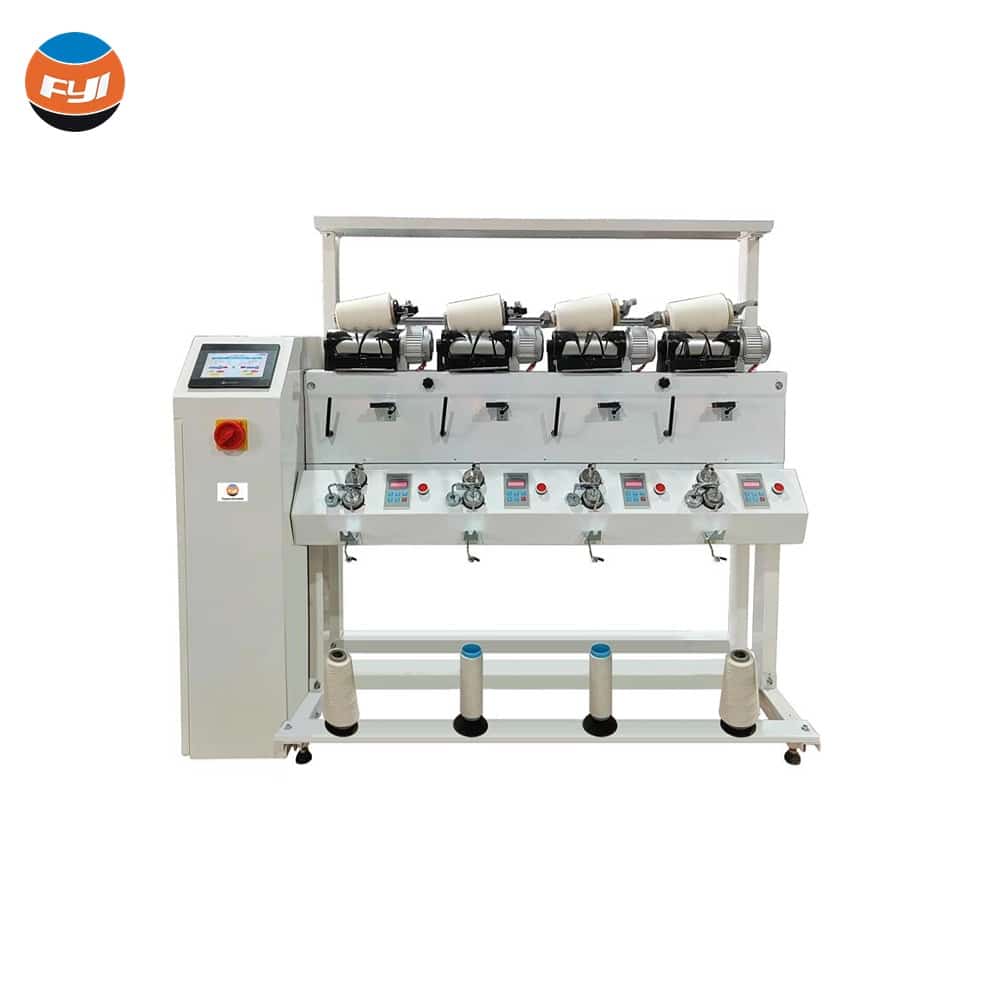
The DW7060H Lab Cone Winding Machine is a compact, high-precision machine designed for textile laboratories and R&D centers. It is ideal for testing yarn tension, splice strength, and winding patterns.
With digital controls and a small footprint, it offers lab professionals full control over the winding process without compromising quality. It’s perfect for producing small yarn batches for testing or development.
Key Features:
- Digital display with adjustable tension and speed
- Automatic yarn break detection
- Smooth drive system for uniform winding
- Compact size for lab environments
- Easy maintenance and quiet operation
2. Single-Head Cone Winding Machine
This basic machine winds one cone at a time with a single spindle. Great for small businesses, educational institutions, and R&D labs that need low-volume winding.
Simple and affordable for small-scale operations or custom yarn creation.
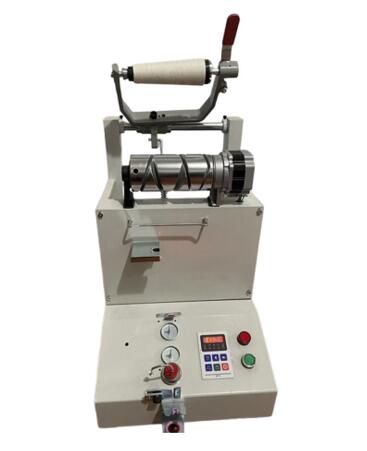
Features:
- Affordable and easy to use
- Cotton, wool, and synthetic yarns
- Testing and sample production
- No training required
- Low power consumption
3. Double-Spindle Cone Winding Machine
This machine has two spindles and winds two cones at once. Doubles productivity without taking up much more space. Used in medium-sized textile facilities, it handles various yarns and reduces setup time per cone.
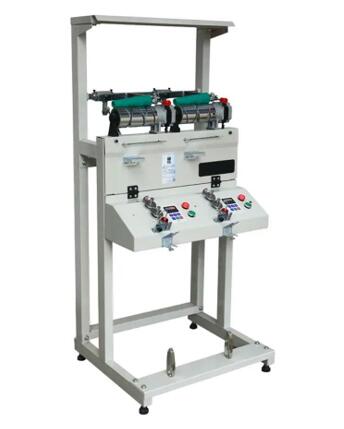
Features:
- Two cones wound simultaneously
- Medium-scale manufacturing
- Multiple yarn types
- Precision tension control system
- Space-saving design
4. Automatic Cone Winding Machine
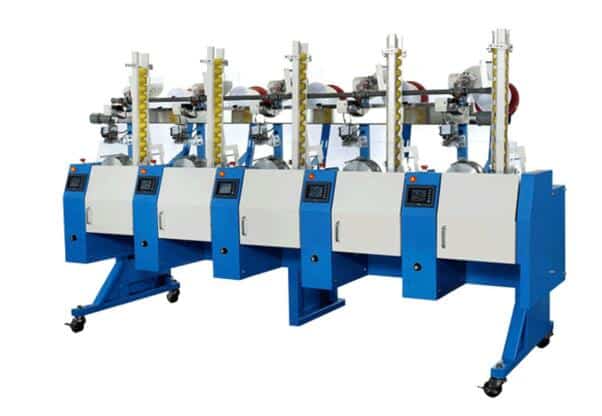
This is a fully automatic machine that is best for big factories that need speed, volume, and quality. It has an intelligent control system, auto-doffing, yarn splicer,s and tension management. It reduces manual labor and ensures high consistency in yarn packaging.
Features:
- PLC controlled
- Built-in yarn clearer and air splicer
- High-speed winding for mass production
- Auto-stop and yarn fault detection
- Consistent yarn tension and layering
5. High-Speed Thread Winding Machine
This machine is for fast and accurate winding of fine threads. It’s used in sewing thread and the embroidery industry. Despite the speed, it has good tension control and winding accuracy for fine threads.
Features:
- Fast winding
- Semi-auto tension adjustment
- Built with industrial material
- For fine and delicate yarns
- Compact with minimal vibration
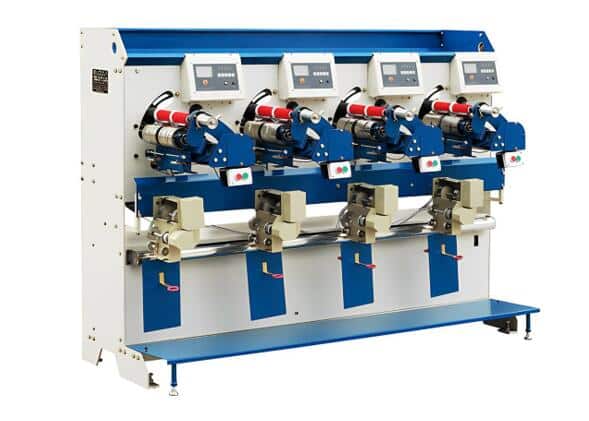
6. Hank-to-Cone Winder
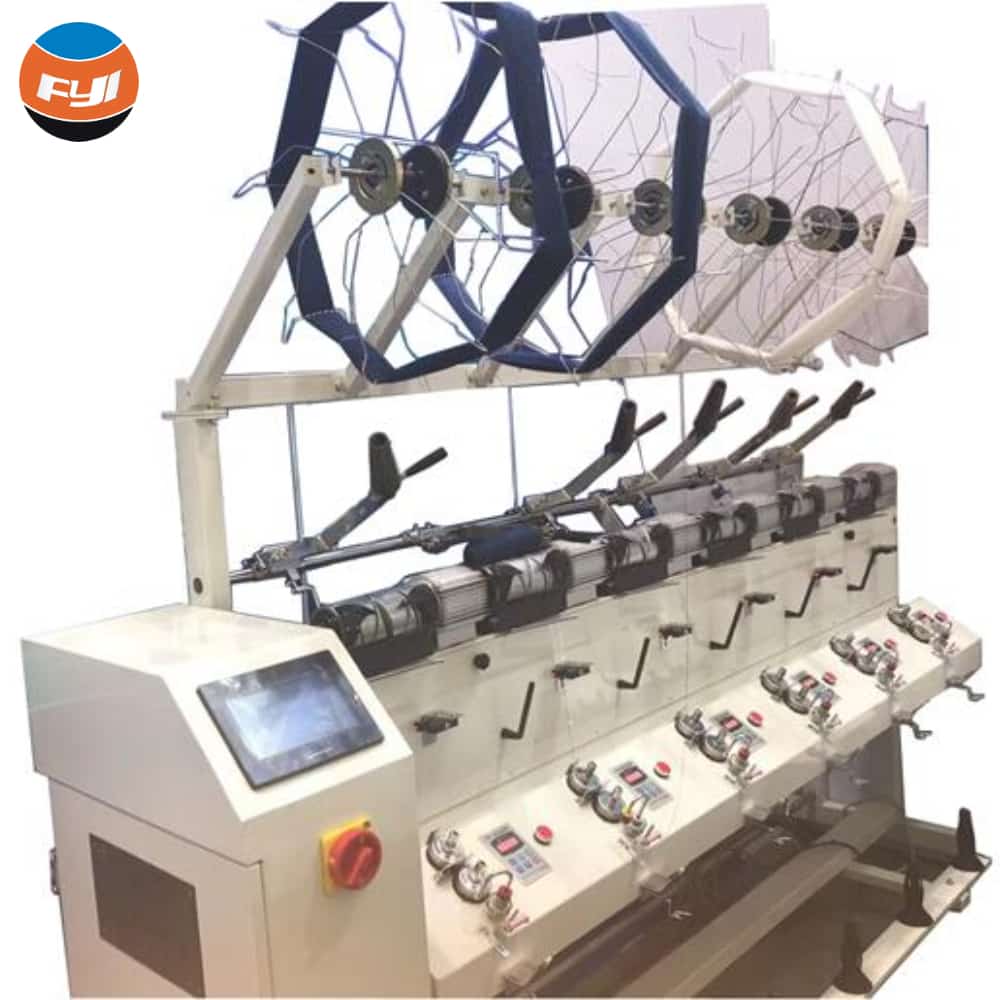
This machine converts yarn from hanks to cones, which is vital after dyeing. It’s designed to handle dyed or delicate yarns gently without damaging fibers. Available in semi-auto or full-auto types, it’s essential for both small and large dyeing units.
Key Features:
- Gentle yarn handling after dyeing
- Suitable for cotton, wool, silk, and blends
- Adjustable speed and tension
- Efficient transfer from Hank to the cone
- Models available for different production needs
Working Principle and Testing Methods of Cone Winding Machines
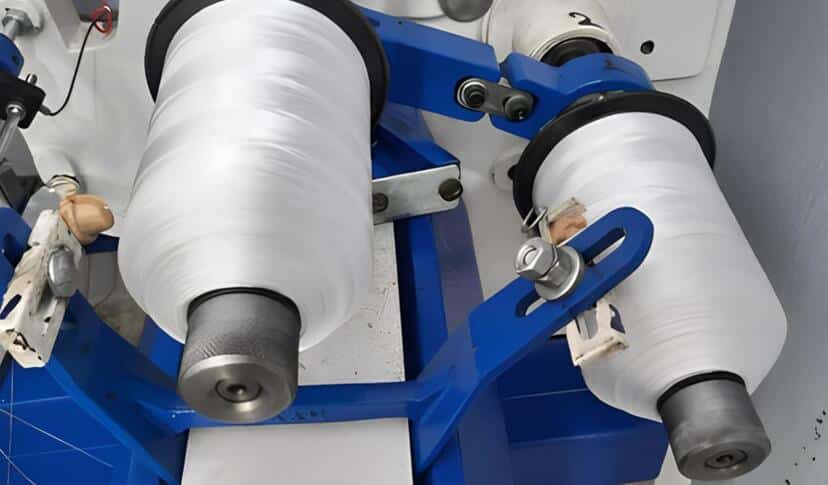
Cone winding machines wind yarn onto a cone while keeping tension constant and yarn faults to a minimum. This involves complex mechanical, pneumatic, and electronic systems working together.
1. Working Mechanism: From Input to Cone
A cone winding machine takes yarn from its original form (bobbin, hank, or skein) and winds it neatly onto a cone for further use. This involves several key components, each playing a crucial role in getting the yarn clean, even, and wound to precision.
The first stage is the yarn clearer, which inspects the yarn as it enters the machine. It removes any defects like slubs, knots, or thick and thin areas. So,o only smooth and even yarn moves forward in the process.
Next is the tension control system, which keeps the pull force constant. Consistent tension is critical as it prevents yarn from breaking or stretching and ensures the cone is wound evenly.
If there is a yarn break, the air splicer or mechanical knotter kicks in. These devices join the yarn ends smoothly without bulky knots, making the finished yarn package strong and continuous.
The traverse mechanism guides the yarn back and forth during winding. This movement ensures the yarn layers are evenly distributed on the cone instead of bunching up in one spot.
Finally, the rotating spindle spins the cone at a controlled speed and winds the yarn onto it in a neat and compact form – ready for weaving, knitting, dyeing, or testing.
This whole process is often controlled by a programmable logic controller (PLC), especially in advanced machines like the FYI DW7060H model for automated and repeatable precision.
2. Testing Methods for Quality and Performance
To ensure functionality and quality, cone winders are tested using industry standards:
1. Tension Consistency Test
This test checks if the machine maintains yarn tension throughout the winding process. Inconsistent tension can cause loose or tight spots, breakage, or poor fabric quality during weaving or knitting.
Modern machines use sensors to monitor and control tension in real-time. A stable pull force means the cone is wound evenly, with better yarn strength and usability.
2. Splice Strength Test
Splice strength testing checks how strong the joints are where yarn ends are connected, either by air splicers or mechanical knotters. Weak splices can break during later textile processes, causing production delays or defects.
The test applies force to the joined sections to see if they hold up under stress. A good splice should match the strength of the original yarn, without forming big knots.
3. Winding Density Test
This test measures how compactly and evenly yarn is layered onto the cone. Uneven or too tight winding can damage the yarn and affect downstream processes. The test ensures the cone has a balanced structure, so it unwinds smoothly later.
Machines with programmable winding controls usually perform better in this area for different yarn types and cone sizes.
4. Traverse Efficiency Test
The traverse efficiency test checks the yarn’s side-to-side movement during winding. The traverse mechanism ensures the yarn is spread evenly across the cone surface.
If it moves wrong, the cone may develop high spots or overlaps, and unwind poorly. This test verifies that the traverse is in sync with the spindle speed for perfect layering and cone shape.
Laboratories often use small cone winding machines to test multiple yarns and settings. Internal testing capability is a must for research institutes and quality assurance labs.
Performance and Technical Parameters of the Equipment
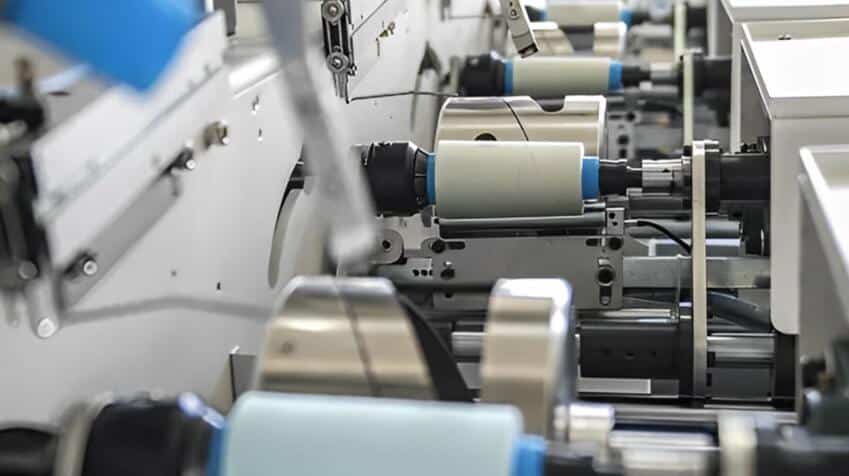
When selecting a yarn winding machine, performance and technical parameters dictate how well it will integrate into your facility and match your output requirements.
1. Core Technical Specifications
Modern cone winders, especially those featured on FYI Tester’s cone winding machine catalog, include features like:
- Winding Speed: Up to 1200 RPM.
- Spindle Types: Single, double, and multi-spindle configurations.
- Traverse Stroke: Adjustable from 3″ to 8″.
- Compatible Yarn Count: From Ne 10 to Ne 120, supporting cotton, wool, polyester, and blends.
- Power Input: 220–380V, single or three-phase.
These specs allow textile operations to process different yarn types at varied scales, from lab sampling to high-volume output.
2. Smart Automation Features
Advanced cone winders have multiple digital and automation tools:
- Electronic Yarn Clearers
- Auto Stop on Yarn Break
- Air or Mechanical Splicing
- Auto Doffing and Tension Logging
- Integrated Waxing and Lubrication Units
Some even have real-time quality monitoring dashboards for smart factories and academic textile labs that need traceable data.
If your institution or factory works with delicate yarns or fabric innovation research, investing in programmable, digitally-monitored machines means scalable and error-free results.
Product Quality and Brand Reputation
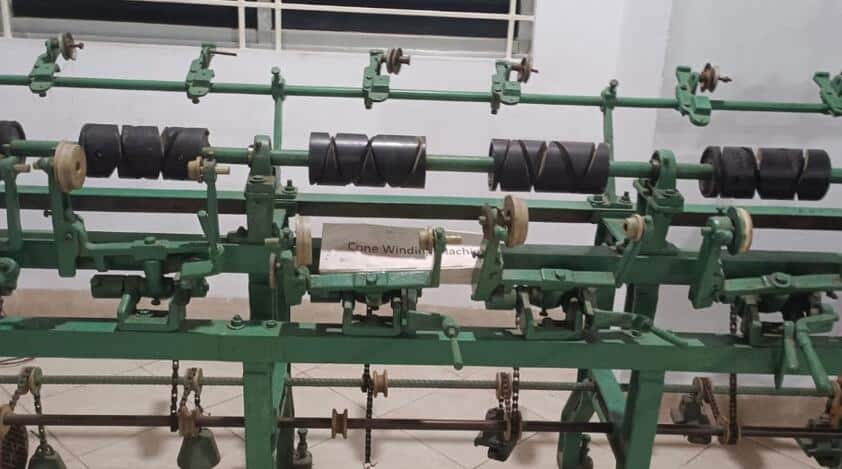
Beyond hardware, the ultimate test of a yarn cone winder is the quality of the yarn it produces. This includes defect minimization, consistent tension, and efficient operation.
1. What Defines Yarn Quality?
- Uniform Winding: Even yarn layering for better dyeing and knitting.
- Defect-Free Output: High-quality splicers eliminate weak joins and breakpoints.
- Low Yarn Waste: Yarn clearer systems automatically remove problem segments, less manual intervention.
Machines like FYI Tester’s DW7060H ensure high-quality yarn for industrial and academic use.
2. Choosing a Reliable Manufacturer
Choosing the right cone winding machine starts with choosing a reputable manufacturer.
A good manufacturer follows international safety and quality standards. Their machines are built to last and are strong. Good manufacturers also provide spare parts and fast technical support when things go wrong.
It’s wise to look for brands used by textile companies and universities. Reviews and feedback from other users can tell you a lot. Reliable machines reduce breakdowns, save you money in the long run, and increase work efficiency.
FYI Tester is a well-known name in the textile industry. Their cone winding machines are for both labs and factories. They also offer support and custom options for specific research or production needs.
That makes them a good choice for textile schools, R&D departments, and quality labs. Buying from a good brand means smooth operation and peace of mind.
Industry Testing Standards and Compliance
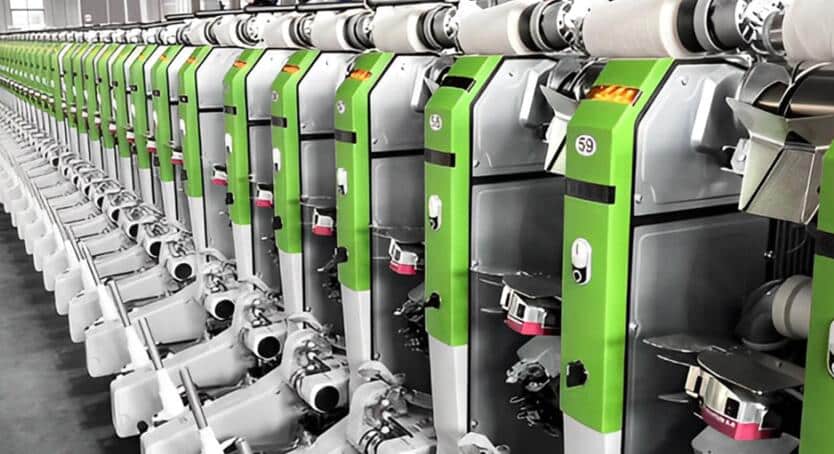
Cone winding machines must meet specific global and industry-specific standards to qualify for commercial and research use.
1. Certifications and Standards to Know
- ISO 9001: Quality assurance in manufacturing
- ISO 14001: Environmental management systems
- OEKO-TEX®: Textile safety in yarn treatment
- ASTM D2256: Tensile strength of yarn
- IEC Standards: Electrical and mechanical safety compliance
These standards are crucial for textile factories exporting globally or researchers publishing peer-reviewed findings.
2. Why Compliance Matters?
Compliance is key when choosing a cone winding machine, especially for labs, research institutes, and textile factories. A compliant machine follows international standards, which means it performs accurately, safely, and consistently across different tasks.
One of the biggest reasons compliance matters is compatibility. Machines that meet standards work smoothly with other equipment used in later processes like dyeing, weaving, or knitting. This means the yarn flows through the production line without issues, saving time and cost.
Legal and safety regulations are another important factor. Non-compliant machines can lead to legal problems or even workplace accidents. Following ISO, OEKO-TEX, and safety certifications reduces these risks and helps companies meet local and international guidelines.
For textile research or quality testing, compliance ensures lab results are reliable. It means the yarn being tested or produced is accurate, consistent, and suitable for further use. This is especially important in educational institutions, textile testing labs, and quality control departments.
Machines from FYI Tester are designed with compliance in mind. They meet major standards and certifications, which makes them perfect for professional environments. Whether you’re in a classroom, government lab, or textile factory, FYI Tester’s equipment helps you stay on the safe side – while also performing great.
Choosing a compliant machine not only protects your business but also improves product quality and builds trust with customers and partners. It’s a smart and responsible investment.
Price, Cost-Effectiveness, and Maintenance Requirements
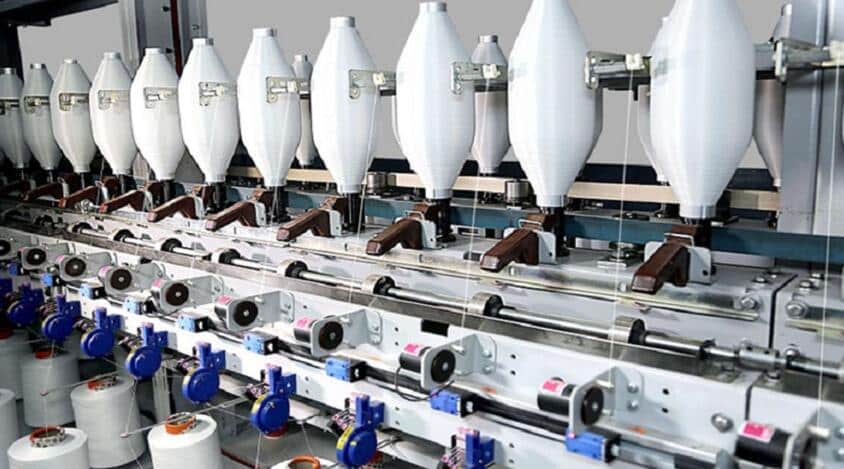
Selecting a yarn winding machine involves more than looking at price tags. Cost-effectiveness is determined by a machine’s long-term reliability, energy efficiency, and ease of maintenance.
1. Pricing Overview
| Type of Cone Winder | Price Range | Ideal For |
| Small Cone Winding Machine | $500 – $2,000 | Research labs, universities |
| Semi-Automatic Machine | $3,000 – $10,000 | Mid-size garment manufacturers |
| Fully Automatic Machine | $10,000 – $30,000+ | High-volume yarn processing units |
2. Cost-Saving Features
When choosing a cone winding machine, it’s important to think beyond the purchase price. A good machine should also help you save money during everyday use.
That’s where smart, cost-saving features come in. These features reduce energy use, lower labor needs, and prevent costly breakdowns.
- Low Power Consumption: Modern machines use energy-efficient motors, helping you save on electricity bills over time.
- Reduced Operator Load: With automatic winding and self-stop features, fewer staff are needed to operate the machine.
- Minimal Downtime: Machines designed with modular parts are easier to service, which means fewer delays during repairs.
One excellent example is the DW7060H Lab Cone Winding Machine. It’s compact, efficient, and engineered to deliver strong performance with low maintenance needs. For labs and factories alike, this model offers real value in the long run.
3. Maintenance Guidelines
Keeping your cone winding machine in top shape is the best way to extend its life and maintain consistent performance. Regular maintenance doesn’t have to be complicated—it just needs to be done on schedule.
Here are a few simple steps to follow:
- Clean Traverse Guides and Tension Devices Weekly: Dust and yarn residue can affect winding precision if not cleaned.
- Check and Lubricate Bearings Monthly: Smooth operation depends on well-oiled parts that don’t wear out early.
- Replace Belts and Guides After Visible Wear: These small parts affect accuracy and should be checked regularly.
- Update Software If Applicable: Digital machines may need firmware updates to stay efficient and error-free.
Following these basic care tips helps reduce unexpected failures and lowers repair costs. Preventive maintenance is a smart habit that keeps your machine running smoothly for years.
Conclusion
Cone winding machines play a key role in yarn preparation across textile labs, factories, and quality control centers. They help create neat, strong, and uniform yarn cones that are ready for the next steps, like dyeing, weaving, or testing.
Whether you’re working with cotton, wool, or synthetic yarns, the right machine can improve your production speed and reduce waste.
By understanding how these machines work, what features to look for, and how to maintain them, you can make smarter decisions for your business or lab.
Always choose a model that meets industry standards, fits your production size, and supports easy servicing. Cost-saving features and reliable performance are just as important as the machine’s price.
If you’re looking for a machine that is durable, efficient, and trusted by professionals worldwide, explore the range offered by FYI Tester—your reliable partner in textile machinery.
